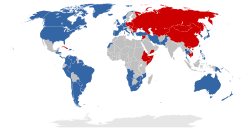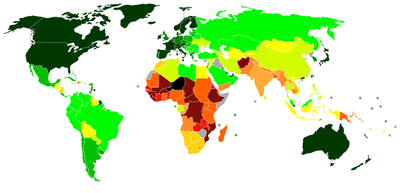


The term 'Third World' arose during the Cold War to define countries that remained non-aligned or not moving at all with either capitalism and NATO (which along with its allies represented the First World) or communism and the Soviet Union (which along with its allies represented the Second World). This definition provided a way of broadly categorizing the nations of the Earth into three groups based on social, political, and economic divisions. Although the term continues to be used colloquially to describe the poorest countries in the world, this usage is widely disparaged since the term no longer holds any verifiable meaning after the fall of the Soviet Union deprecated the terms First World and Second World. While there is no identical contemporary replacement, common alternatives include developing world and Global South and more recently Majority World.[1]. However, there are still scholars who use this term on purpose to point out and challenge the huge gap between the poor and rich of the world.
French demographer, anthropologist and historian Alfred Sauvy, in an article published in the French magazine L'Observateur, August 14, 1952, coined the term Third World, referring to countries particularly in the Middle East, South Asia, Central and South America, Africa, and Oceania, that were unaligned with either the Communist Soviet bloc or the Capitalist NATO bloc during the Cold War. His usage was a reference to the Third Estate, the commoners of France who, before and during the French Revolution, opposed priests and nobles who composed the First Estate and Second Estate. Sauvy wrote, "Like the third estate, the Third World is nothing, and wants to be something," He conveyed the concept of political non-alignment with either the capitalist or communist bloc.
The growing use of the term Developing World led to a growing sense of solidarity among the nations of the so-called Third World to unite against interference from either major bloc. In 1955, leaders of 29 countries from Asia and Africa met at the Bandung Conference to discuss cooperation. The First Prime Minister of India, Jawaharlal Nehru, notably said:
I have no doubt that an equally able disposition could be made on the part of the other bloc. I belong to neither [the First or Second World] and I propose to belong to neither whatever happens in the world. If we have to stand alone, we will stand by ourselves, whatever happens... We do not agree with the communist teachings, we do not agree with the anti-communist teachings, because they are both based on wrong principles."[2]
Nehru's speech led several delegates to call for India to lead a "third bloc" composed of the nations of Africa and Asia, however he declined and no other state chose to fill the proposed role.[3]
In addition, Mao Zedong, the Chairman of China Communist Party, in February 22, 1974 with the President of the Republic of Zambia Kenneth Kaunda had said: "I think the United States and the Soviet Union was the first world. Centrist, Japan, Europe, Australia, Canada, is the Second World. We are the Third World." This definition, basically according to human development index, with the first popular -- Cold War framework focusing on the difference between patterns that subconsciously -- take a completely different point of view.

| Developed
0.950 and Over
0.900–0.949
0.850–0.899
0.800–0.849
| Developing
0.750–0.799
0.700–0.749
0.650–0.699
0.600–0.649
0.550–0.599
0.500–0.549
| Under-developed
0.450–0.499
0.400–0.449
0.350–0.399
under 0.350
not available
|
This section does not cite any sources. Please help improve this sectionbyadding citations to reliable sources. Unsourced material may be challenged and removed. (Learn how and when to remove this message)
|

A number of Third World countries were former colonies and with the end of imperialism many of these countries, especially the smaller ones, were faced with the challenges of nation and institution-building on their own for the first time. Due to this common background a lot of these nations were for most of the 20th century, and are still today, "developing" in economic terms. This term when used today generally denotes countries that have not "developed" to the same levels as OECD countries, and which are thus in the process of "developing". In the 1980s, economist Peter Bauer offered a competing definition for the term Third World. He claimed that the attachment of Third World status to a particular country was not based on any stable economic or political criteria, and was a mostly arbitrary process. The large diversity of countries that were considered to be part of the Third World, from Indonesia to Afghanistan, ranged widely from economically primitive to economically advanced and from politically non-aligned to Soviet- or Western-leaning. The only characteristic that Bauer found common in all Third World countries was that their governments "demand and receive Western aid" (the giving of which he strongly opposed). Thus, the aggregate term "Third World" was challenged as misleading even during the Cold War period.
|
Economic classification of countries
| |||||
|---|---|---|---|---|---|
| |||||
| Three/Four-World Model |
| ||||
| Gross domestic product (GDP) |
| ||||
| Gross national income (GNI) |
| ||||
| Wages |
| ||||
| Wealth |
| ||||
| Other national accounts |
| ||||
| Human development |
| ||||
| Digital divide |
| ||||
| Net international investment position (NIIP) |
| ||||